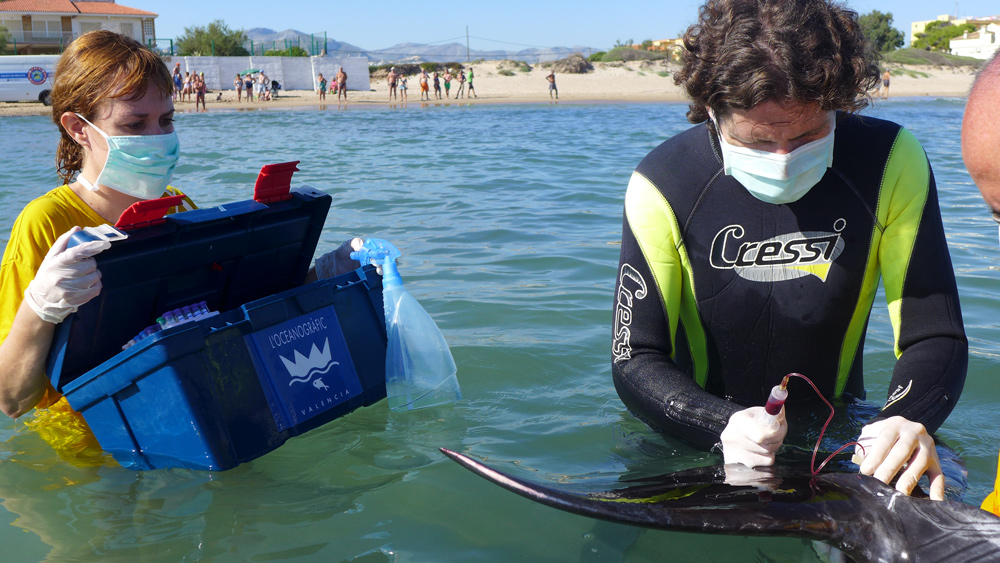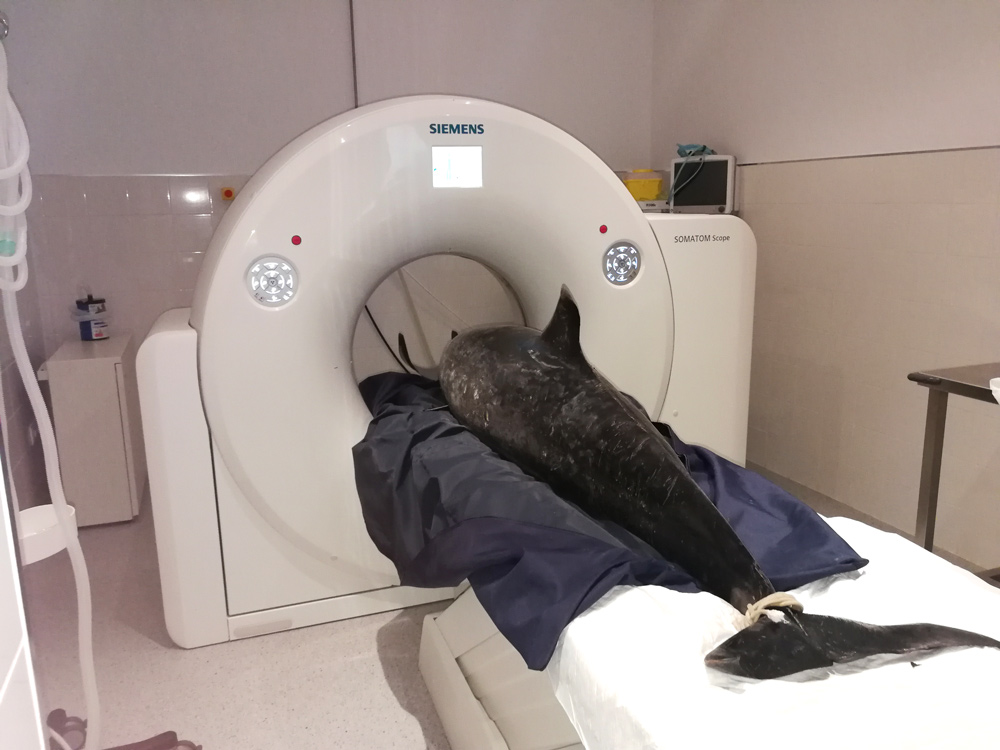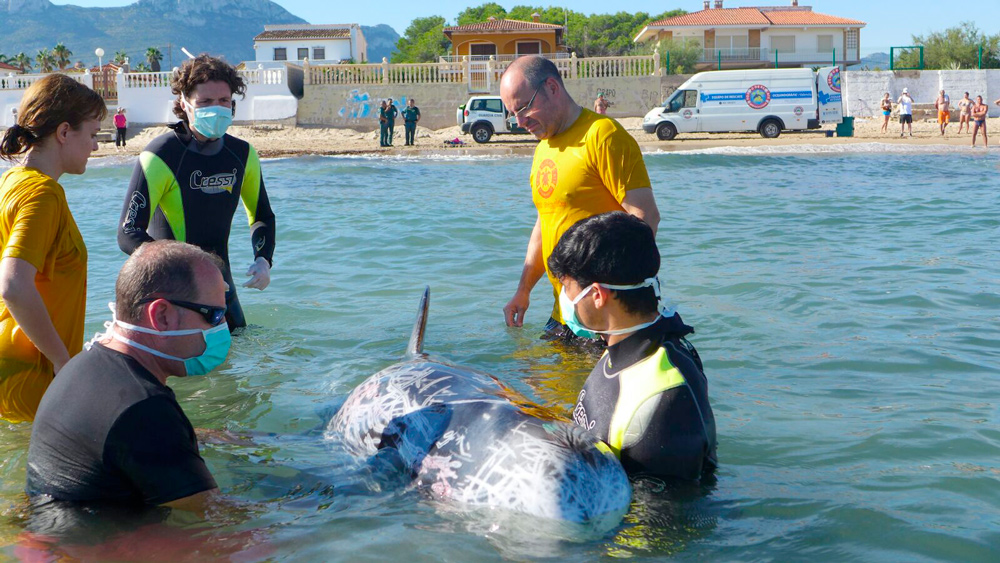MARINE ANIMAL HEALTH

 The main objectives of the Marine Health project are the evaluation, monitoring and improvement of the health of the marine fauna of the Mediterranean Sea, contributing to the conservation of the marine ecosystem and the prevention of possible massive strandings.
The main objectives of the Marine Health project are the evaluation, monitoring and improvement of the health of the marine fauna of the Mediterranean Sea, contributing to the conservation of the marine ecosystem and the prevention of possible massive strandings.
For this, we study stranded animals from the Valencian Community coast, thanks to a collaboration agreement between our research group, the Oceanografic and the Oceanografic Foundation, which is part of the Stranding Network in this autonomous community. The agreement provides us with access to the strandings, a large number of samples of stranded animals for their microbiological and pathological study, and the possibility of collaborating with a large team of researchers from the marine world.
 As part of the activities we carry out, we participate in the necropsies performed on stranded cetaceans to try to identify the causes of stranding by taking samples and analyzing them through virological, molecular and immunohistological techniques. In addition, the different samples are stored in our tissue bank in which we already have more than 5000 samples and two copies of them, one in the Oceanografic and the other in our laboratory at VISAVET, which allows us to carry out different present and future studies. Several doctoral candidates have presented their theses thanks to this research project and the tissue bank, as well as collaborations with other scientific groups in the marine world and the exchange of biological material. Some of the samples that we keep in the bank will help us to better understand our marine environment.
As part of the activities we carry out, we participate in the necropsies performed on stranded cetaceans to try to identify the causes of stranding by taking samples and analyzing them through virological, molecular and immunohistological techniques. In addition, the different samples are stored in our tissue bank in which we already have more than 5000 samples and two copies of them, one in the Oceanografic and the other in our laboratory at VISAVET, which allows us to carry out different present and future studies. Several doctoral candidates have presented their theses thanks to this research project and the tissue bank, as well as collaborations with other scientific groups in the marine world and the exchange of biological material. Some of the samples that we keep in the bank will help us to better understand our marine environment.
Second, we perform molecular detection of different infectious agents that affect these animals, in order to complete the diagnosis of the cause (or causes) of death. In addition, screening studies of the main emerging diseases (Morbillivirus infection, Herpesvirus and brucellosis) are made in all stranded animals, even in the absence of lesions. It has been verified that these microorganisms are those that are associated with higher mortality rates. We are studying what is its prevalence level at each moment, in order to predict possible massive strandings.
 Third, we carry out different epidemiological studies, which allow us to better understand the transmission and risk factors of different infectious agents. Thanks to molecular epidemiology studies we know which strains of a certain virus are those that are circulating on our coasts at all times, and comparing them with other sequences previously described in other parts of the world and registered in GenBank, we can study their possible origin. Furthermore, by studying the characteristics of infected individuals (species, age, sex, etc.), as well as the lesions found in them, we can obtain information on possible factors that make certain individuals more susceptible to infection and developing or not developing disease.
Third, we carry out different epidemiological studies, which allow us to better understand the transmission and risk factors of different infectious agents. Thanks to molecular epidemiology studies we know which strains of a certain virus are those that are circulating on our coasts at all times, and comparing them with other sequences previously described in other parts of the world and registered in GenBank, we can study their possible origin. Furthermore, by studying the characteristics of infected individuals (species, age, sex, etc.), as well as the lesions found in them, we can obtain information on possible factors that make certain individuals more susceptible to infection and developing or not developing disease.
Finally, metagenomics studies are also carried out, in order to describe new viruses that can infect these animals. This technique is especially useful in poorly studied species, such as marine species.
PhD Thesis
-
Estudio de los factores de riesgo de las enfermedades virológicas emergentes y zoonóticas de los mamíferos marinos. Ignacio Vargas Castro. Facultad de Veterinaria de la Universidad Complutense de Madrid (realización en curso).
-
Nuevos avances en el diagnóstico de enfermedades de mamíferos marinos. Mar Melero Asensio, junio 2017. Sobresaliente Cum Laude por Unanimidad (Mención Europea)
-
Detección, prevalencia y epidemiología molecular de virus en cetáceos del Mediterráneo. Consuelo Rubio Guerri. Facultad de Veterinaria de la Universidad Complutense de Madrid, octubre 2015. Sobresaliente Cum Laude por Unanimidad (Mención Europea). Premio Extraordinario de Doctorado
-
Avances en virología de cetáceos: caracterización molecular de nuevas secuencias de morbilllivirus y Herpesvirus. Edwige Nina Belliere. Facultad de Veterinaria de la Universidad Complutense de Madrid, octubre 2012. Sobresaliente Cum Laude por Unanimidad
-
Evaluación de los efectos inmunotoxicológicos de contaminantes ambientales en las células inmunes del delfín mular. Susana Cámara Pellissó. Facultad de Veterinaria de la Universidad Complutense de Madrid, noviembre 2007. Sobresaliente Cum Laude
Publications
-
 Ignacio Vargas-Castro, José Luis Crespo-Picazo, Belén Rivera-Arroyo, Rocío Sánchez, Vicente Marco-Cabedo, María Ángeles Jiménez-
Ignacio Vargas-Castro, José Luis Crespo-Picazo, Belén Rivera-Arroyo, Rocío Sánchez, Vicente Marco-Cabedo, María Ángeles Jiménez-Martínez, Manena Fayos, Ángel Serdio, Daniel García-Párraga, José Manuel Sánchez-Vizcaíno. Alpha- and gammaherpesviruses in stranded striped dolphins (Stenella coeruleoalba) from Spain: first molecular detection of gammaherpesvirus infection in central nervous system of odontocetes. BMC Vet Res 16, 288. 2020. -
 Melero M., Giménez-Lirola LG., Rubio-Guerri C., Crespo JL., Sierra E., García-Párraga D., García-Peña FJ., Arbelo M., Álvaro T., Valls M., Sánchez-Vizcaíno JM. "Fluorescent microbead-based immunoassay for anti-Erysipelothrix rhusiopathiae antibody detection in cetaceans". Dis Aquat Org. 117: 237-243. 1/2016.
Melero M., Giménez-Lirola LG., Rubio-Guerri C., Crespo JL., Sierra E., García-Párraga D., García-Peña FJ., Arbelo M., Álvaro T., Valls M., Sánchez-Vizcaíno JM. "Fluorescent microbead-based immunoassay for anti-Erysipelothrix rhusiopathiae antibody detection in cetaceans". Dis Aquat Org. 117: 237-243. 1/2016. -
 Melero M., Crespo-Picazo J.L., Rubio-Guerri C., García-Párraga D., Sánchez-Vizcaíno J.M. 2015. "First molecular determination of herpesvirus from two mysticete species stranded in the Mediterranean Sea". BMC Vet Res. 11:283. 11/2015.
Melero M., Crespo-Picazo J.L., Rubio-Guerri C., García-Párraga D., Sánchez-Vizcaíno J.M. 2015. "First molecular determination of herpesvirus from two mysticete species stranded in the Mediterranean Sea". BMC Vet Res. 11:283. 11/2015. -
 Melero M, Rodríguez-Prieto V, Rubio-García A, García-Párraga D, Sánchez-Vizcaíno JM. "Thermal reference points as an index for monitoring body temperature in marine mammals". BMC Res Notes. 8(1):411. 09/2015.
Melero M, Rodríguez-Prieto V, Rubio-García A, García-Párraga D, Sánchez-Vizcaíno JM. "Thermal reference points as an index for monitoring body temperature in marine mammals". BMC Res Notes. 8(1):411. 09/2015. -
 Jiménez Martínez MA, Rubio-Guerri C, Melero M, Crespo JL, García D, Sánchez-Vizcaíno JM. "Histopathological findings in cetaceans stranded on the spanish mediterranean coast between 2011 and 2014". Journal of Comparative Pathology. 152(1):89. 1/2015.
Jiménez Martínez MA, Rubio-Guerri C, Melero M, Crespo JL, García D, Sánchez-Vizcaíno JM. "Histopathological findings in cetaceans stranded on the spanish mediterranean coast between 2011 and 2014". Journal of Comparative Pathology. 152(1):89. 1/2015. -
 Rubio-Guerri, C., García-Párraga, D., Nieto-Pelegrín, E., Melero, M., Álvaro, T., Valls, M., Crespo, JL, Sánchez-Vizcaíno, JM., “Novel adenovirus detected in captive bottlenose dolphins (Tursiops truncatus) suffering from self-limiting gastroenteritis” BMC Vet Res. 11:53. (Online 3/2015).
Rubio-Guerri, C., García-Párraga, D., Nieto-Pelegrín, E., Melero, M., Álvaro, T., Valls, M., Crespo, JL, Sánchez-Vizcaíno, JM., “Novel adenovirus detected in captive bottlenose dolphins (Tursiops truncatus) suffering from self-limiting gastroenteritis” BMC Vet Res. 11:53. (Online 3/2015). -
 Melero M., Garcia-Párraga D., Corpa J., Ortega J., Rubio-Guerri C., Crespo J., Rivera-Arroyo B., Sanchez-Vizcaino J.. “First molecular detection and characterization of herpesvirus and poxvirus in a Pacific walrus ( Odobenus rosmarus divergens)”. BMC Vet Res. 10:968. (Online 12/2014).
Melero M., Garcia-Párraga D., Corpa J., Ortega J., Rubio-Guerri C., Crespo J., Rivera-Arroyo B., Sanchez-Vizcaino J.. “First molecular detection and characterization of herpesvirus and poxvirus in a Pacific walrus ( Odobenus rosmarus divergens)”. BMC Vet Res. 10:968. (Online 12/2014). -
 Crespo JL, García-Párraga D, Giménez I, Rubio-Guerri C, Melero M, Sánchez-Vizcaíno JM, Marco A, Cuesta JA, Muñoz MJ."Two cases of pseudohermaphroditism in loggerhead sea turtles Caretta caretta". Dis Aquat Organ. 105(3):183-91. 9/2013
Crespo JL, García-Párraga D, Giménez I, Rubio-Guerri C, Melero M, Sánchez-Vizcaíno JM, Marco A, Cuesta JA, Muñoz MJ."Two cases of pseudohermaphroditism in loggerhead sea turtles Caretta caretta". Dis Aquat Organ. 105(3):183-91. 9/2013 -
 Rubio-Guerri C, Melero M, Esperón F, Bellière EN, Arbelo M, Crespo JL, Sierra E, García-Párraga D, Sánchez-Vizcaíno JM. "Unusual striped dolphin mass mortality episode related to cetacean morbillivirus in the Spanish Mediterranean Sea". BMC Vet Res. 9(1):106. 5/2013.
Rubio-Guerri C, Melero M, Esperón F, Bellière EN, Arbelo M, Crespo JL, Sierra E, García-Párraga D, Sánchez-Vizcaíno JM. "Unusual striped dolphin mass mortality episode related to cetacean morbillivirus in the Spanish Mediterranean Sea". BMC Vet Res. 9(1):106. 5/2013. -
 Rubio-Guerri C, Melero M, Rivera-Arroyo B, Bellière EN, Crespo JL, García-Párraga D, Esperón F, Sánchez-Vizcaíno JM. "Simultaneous diagnosis of Cetacean morbillivirus infection in dolphins stranded in the Spanish Mediterranean sea in 2011 using a novel Universal Probe Library (UPL) RT-PCR assay". Veterinary Microbiology. S0378-1135(13)00040-0. 1/2013.
Rubio-Guerri C, Melero M, Rivera-Arroyo B, Bellière EN, Crespo JL, García-Párraga D, Esperón F, Sánchez-Vizcaíno JM. "Simultaneous diagnosis of Cetacean morbillivirus infection in dolphins stranded in the Spanish Mediterranean sea in 2011 using a novel Universal Probe Library (UPL) RT-PCR assay". Veterinary Microbiology. S0378-1135(13)00040-0. 1/2013. -
 Rodríguez-Prieto V., Rubio-García A., Melero M., García D., and Sánchez-Vizcaíno JM."Identification of the pattern of appearance and development of thermal windows in the skin of juvenile Pacific walruses (Odobenus rosmarus divergens) in a controlled environment". Marine Mamal Science. 29(1):167-176. 1/2013.
Rodríguez-Prieto V., Rubio-García A., Melero M., García D., and Sánchez-Vizcaíno JM."Identification of the pattern of appearance and development of thermal windows in the skin of juvenile Pacific walruses (Odobenus rosmarus divergens) in a controlled environment". Marine Mamal Science. 29(1):167-176. 1/2013. -
 Esperon F., Garcia-Parraga D., Belliere EN. and Sanchez-Vizcaino JM.. "Molecular diagnosis of lobomycosis-like disease in a bottlenose dolphin in captivity". Medical Mycology. 50(1):106-109. 1/2012
Esperon F., Garcia-Parraga D., Belliere EN. and Sanchez-Vizcaino JM.. "Molecular diagnosis of lobomycosis-like disease in a bottlenose dolphin in captivity". Medical Mycology. 50(1):106-109. 1/2012 -
 Melero M., Rubio-Guerri C., Crespo JL., Arbelo M., Vela AI., García D., Sierra E., Domínguez L., y Sánchez-Vizcaíno JM. "First case of erysipelas in a free-ranging bottlenose dolphin (Tursiops truncatus) stranded in the Mediterranean Sea". Diseases of Aquatic Organisms. 97(2):167-170. 12/2011
Melero M., Rubio-Guerri C., Crespo JL., Arbelo M., Vela AI., García D., Sierra E., Domínguez L., y Sánchez-Vizcaíno JM. "First case of erysipelas in a free-ranging bottlenose dolphin (Tursiops truncatus) stranded in the Mediterranean Sea". Diseases of Aquatic Organisms. 97(2):167-170. 12/2011 -
 Bellière EN., Esperón F. y Sánchez-Vizcaíno JM.. "Genetic comparison among dolphin morbillivirus in the 1990-1992 and 2006-2008 Mediterranean outbreaks". Infection, genetics and evolution. 11(8):1913-1920. 12/2011
Bellière EN., Esperón F. y Sánchez-Vizcaíno JM.. "Genetic comparison among dolphin morbillivirus in the 1990-1992 and 2006-2008 Mediterranean outbreaks". Infection, genetics and evolution. 11(8):1913-1920. 12/2011 -
 Bellière, EN., Esperón, F., Fernández, A., Arbelo, M., Muñoz, MJ, Sánchez-Vizcaíno, JM. "Phylogenetic analysis of a new Cetacean morbilivirus from a short-finned pilot whale stranded in the Canary Islands". Research in Veterinary Science. 90(2):324-8. 4/2011
Bellière, EN., Esperón, F., Fernández, A., Arbelo, M., Muñoz, MJ, Sánchez-Vizcaíno, JM. "Phylogenetic analysis of a new Cetacean morbilivirus from a short-finned pilot whale stranded in the Canary Islands". Research in Veterinary Science. 90(2):324-8. 4/2011 -
 Bellière, EN., Esperón, F., Arbelo, M., Muñoz, MJ., Fernández, A., Sánchez-Vizcaíno, JM.. "Presence of herpesvirus in striped dolphins stranded during the cetacean morbillivirus epizootic along the Mediterranean Spanish coast in 2007". Archives of Virology. 155(8):1307-11. 8/2010.
Bellière, EN., Esperón, F., Arbelo, M., Muñoz, MJ., Fernández, A., Sánchez-Vizcaíno, JM.. "Presence of herpesvirus in striped dolphins stranded during the cetacean morbillivirus epizootic along the Mediterranean Spanish coast in 2007". Archives of Virology. 155(8):1307-11. 8/2010. -
 Esperón, F., Fernández, A., Sánchez-Vizcaíno, JM. (2008). “Herpes simplex-like infection in a bottlenose dolphin stranded in the Canary Islands”. Diseases Of Aquatic Organisms. Vol.81:73-73.
Esperón, F., Fernández, A., Sánchez-Vizcaíno, JM. (2008). “Herpes simplex-like infection in a bottlenose dolphin stranded in the Canary Islands”. Diseases Of Aquatic Organisms. Vol.81:73-73. -
 Cámara, S., Múñoz, MJ., Carballo, M., Sánchez-Vizcaíno, JM (2008). “Determination of the inmunotoxic potential of heavy metals on the functional activity of bottlenose dolphin leukocytes in vitro". Veterinary Inmunology and Immunopathology. 121, 189-198.
Cámara, S., Múñoz, MJ., Carballo, M., Sánchez-Vizcaíno, JM (2008). “Determination of the inmunotoxic potential of heavy metals on the functional activity of bottlenose dolphin leukocytes in vitro". Veterinary Inmunology and Immunopathology. 121, 189-198.


